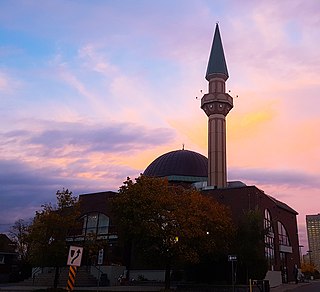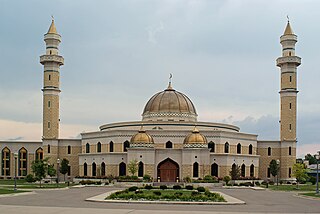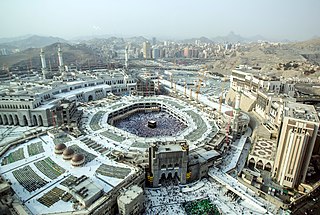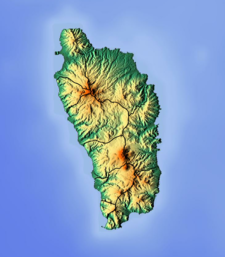A mosque or masjid is a place of prayer for Muslims. Mosques are usually covered buildings, but can be any place where prayers (salah) are performed, including outdoor courtyards.

Al-Aqsa Mosque, properly Jāmiʿ al-Aqṣā, also known as the Qibli Mosque or Qibli Chapel, is a congregational mosque or prayer hall in the Al-Aqsa mosque compound in the Old City of Jerusalem. In some sources the building is also named al-Masjid al-Aqṣā, but this name primarily applies to the whole compound in which the building sits, which is itself also known as "Al-Aqsa Mosque". The wider compound is known as Al-Aqsa or the Al-Aqsa Mosque compound, known honorifically as al-Ḥaram al-Sharīf, and as the Temple Mount.

The Id Kah Mosque is a historic mosque and tourist site located in Kashgar, Xinjiang, China.

Islam in Canada is a minority religion practised mostly by the immigrants and their descendants from Muslim majority countries. Muslims have lived in Canada since 1871 and the first mosque was established in 1938. Most Canadian Muslims are Sunni, while a significant minority are Shia and Ahmadiyya.

Islam is the third largest religion in the United States (1%), behind Christianity and Judaism, equaling Buddhism and Hinduism percentage wise. A 2017 study estimated that 3.45 million Muslims were living in the United States, about 1.1 percent of the total U.S. population. In 2017, 20 states which were mostly in the South and Midwest reported Islam being the largest non-Christian religion. In 2020, the U.S. Religion Census found there to be 4.45 million Muslims in the country, making up 1.3% of the population.

Islam's significance in Germany has largely increased after the labour migration in the 1960s and several waves of political refugees since the 1970s.

The Barelvi movement, also known as Ahl al-Sunnah wa'l-Jamaah is a Sunni revivalist movement following the Hanafi and Shafi'i schools of jurisprudence, and Maturidi and Ashʿari schools of theology with strong Sufi influences and with over hundreds of millions of followers in South Asia and also in parts of Europe, America and Africa. It is a broad Sufi-oriented movement that encompasses a variety of Sufi orders, including the Chistis, Qadiris, Soharwardis and Naqshbandis as well as many other orders and sub-orders of Sufism. They consider themselves to be the continuation of Sunni Islamic orthodoxy before the rise of Salafism and Deobandi Movement.

Islam is the second largest religion in the United Kingdom, with results from the 2011 Census giving the total population as 2,786,635, or 4.4% of the total UK population, while the 2021 Census results released so far show a population of 3,868,133 (6.5%) in England and Wales, 3,801,179 in England and 66,950 in Wales. The 2011 census reported 76,737 Muslims in Scotland (1.45%). London has the greatest population of Muslims in the country. The vast majority of Muslims in the United Kingdom adhere to Sunni Islam, while smaller numbers are associated with Shia Islam.

Dominica is an overwhelmingly Christian majority country, with adherents of Islam being a minuscule minority. Due to secular nature of the Dominica's constitution, Muslims are free to proselytize and build places of worship in the country.

The bedug is one of the drums used in the gamelan. It is also used among Muslims in Indonesia and Malaysia to signal mosque prayer times. The hitting of the instrument is particularly done according to a rhythm that goes in an increasingly rapid pace.

The holiest sites in Islam are predominantly located in the Arabian Peninsula and the Levant. While the significance of most places typically varies depending on the Islamic sect, there is a consensus across all mainstream branches of the religion that affirms three cities as having the highest degree of holiness, in descending order: Mecca, Medina, and Jerusalem. Mecca's Al-Masjid al-Haram, Al-Masjid an-Nabawi in Medina, and Al-Masjid al-Aqsa in Jerusalem are all revered by Muslims as sites of great importance.

Islam is a minor religion in Taiwan and it represents about 0.3% of the population. There are around 60,000 Muslims in Taiwan, in which about 90% belong to the Hui ethnic group. There are also more than 250,000 foreign Muslims working in Taiwan from Indonesia, Malaysia, Thailand and the Philippines, as well as other nationalities from more than 30 countries. As of 2018, there are eleven mosques in Taiwan, with the most notable being the Taipei Grand Mosque, the oldest and largest one.

The Madina Mosque or Madina Masjid, also known as the "Wolseley Road Mosque", is the first purpose-built mosque in Sheffield, South Yorkshire, England. After some problems with funding, the project was completed in October 2006. Users of the mosque raised several million pounds to pay for the new mosque and Islamic centre which includes 19 rooms and two large halls, a library and a day centre. The project is estimated to have cost £5 million. The mosque was built on Glover Road, Sheffield, and intended to serve the Muslim populations of Nether Edge and Sharrow. The mosque has a capacity of 2,300.

Islam is a minority religion in Palau.

The Hundred-word Eulogy is a 100-character praise of Islam and the Islamic prophet Muhammad written by the Hongwu Emperor of the Chinese Ming dynasty. Copies of it are on display in several mosques in Nanjing, China.

Masjid al-Haram, also known as the Grand Mosque or the Great Mosque of Mecca, is a mosque enclosing the vicinity of the Kaaba in Mecca, in the Mecca Province of Saudi Arabia. It is a site of pilgrimage in the Hajj, which every Muslim must do at least once in their lives if able, and is also the main phase for the ʿUmrah, the lesser pilgrimage that can be undertaken any time of the year. The rites of both pilgrimages include circumambulating the Kaaba within the mosque. The Great Mosque includes other important significant sites, including the Black Stone, the Zamzam Well, Maqam Ibrahim, and the hills of Safa and Marwa.

The history of Islam in the Arctic starts relatively late in the chronology of Islamic history, the Arctic Circle being at a great distance from traditional Muslim bastions of power and settlement. The "climatic conditions, remoteness and heavy industrial character" of northern cities have resulted in a unique cultural shift for Muslims living in the region, including a tendency towards pluralism wherein sects like Sunni and Shia Muslims do not segregate themselves. In areas where the midnight sun or polar night renders the five daily prayers impossible to tie to dusk and dawn, congregants typically either use the same timing as a more southern region, the holy city of Mecca or their homelands.














